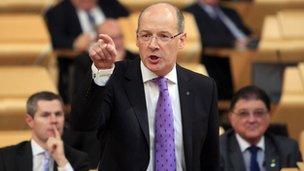John Swinney unveils spending plans in draft budget
- Published
Scottish Finance Secretary John Swinney has announced his spending plans aimed at stimulating Scotland's economy.
Setting out his 2013/14 draft budget, he pledged £180m over two years for skills, construction and the green economy.
It includes £40m of additional spending on affordable housing, starting this year, and £80m on new schools to support the construction sector.
He told parliament it was a "Scottish budget for jobs and growth".
"In these difficult economic times this government is doing everything within its limited power to stimulate Scotland's economy, to invest in our young people, protect households and support front line services," he said.
Mr Swinney said his budget maintained commitments on tuition fees, a council tax freeze, police numbers, free prescriptions and concessionary travel, as well as protection of the NHS budget.
The minister also announced that pay restraint for public sector workers would be eased with "a modest 1% increase".
The lower paid will see most of the additional money.
A freeze on public sector pay for those earning more than £21,000 was implemented in the 2011/12 financial year and was due to come to an end in March 2013.
Earlier Mr Swinney said his plans would be a "relentless pursuit of economic growth", despite UK government cuts.
Investments include £30m to be spent over three years on a Green Investment Package of energy efficiency measures, concentrating on domestic property.
An Energy Skills Academy will also be established to support the creation of skills in the oil and gas, renewables, thermal generation and carbon capture and storage industries.
Mr Swinney announced support for a national employer recruitment initiative which he said would create up to 10,000 opportunities for small and medium sized companies to recruit young people.
And £17m will go towards college education and student support.
A total of £955m has been stripped from the local government budget to be transferred centrally for the single Scottish police force, and £275m will also be taken from councils to fund the unified Scottish fire service.
'Pass the buck'
Mr Swinney said: "We are doing everything we can to support growth, public services and opportunities for the future but the UK government needs to realise that more needs to be done.
"Only with the full levers of independence can Scotland properly capture economic opportunity and tackle inequality and poverty and we can do so more efficiently and effectively than currently happens in the UK."
Ken Macintosh, Labour's finance spokesman, said: "This is yet again another pass the buck budget from John Swinney.

Mr Swinney told MSPs it was "a Scottish budget for jobs and growth"
"The unfortunate result of this budget is likely to be the loss of more public sector jobs, but with very little to kick start the Scottish economy."
Conservative finance spokesman Gavin Brown claimed most of the new spending announced by Mr Swinney was simply replacing money he had previously cut.
The Scottish Greens described the draft budget "as one the Tories would be proud of", by proposing a 1% pay cap on public sector workers.
And Willie Rennie, leader of the Scottish Liberal Democrats said: "Mr Swinney said he wanted a "relentless pursuit of economic growth" but this is a timid budget proposed by a government more focused on independence than economic growth."
The Scottish Trades Union Congress expressed disappointment that Mr Swinney had "followed George Osborne's public sector pay policy almost to the letter".
General secretary Grahame Smith added: "A third year of significant real terms wage cuts for hundreds of thousands of workers puts Mr Swinney's attempts at stimulus into perspective."
Apprentice numbers
The Scottish Federation of Housing Associations (SFHA) said it welcomed the announcement of an additional £40m investment in affordable housing.
Chief executive Mary Taylor said: "We are extremely pleased that it recognises the immediate economic and social benefits for Scotland in building more affordable homes."
"We also welcome the government's recognition of the benefits of focusing on construction investment."
The Scottish Building Federation said it welcomed the moves to prioritise additional funds for affordable housing over the next financial year.
But it called for greater priority to be given at Holyrood towards funding energy efficiency, fast-tracking procurement reforms and rebuilding construction apprentice numbers.
- Published20 September 2012
- Published10 September 2012
- Published27 June 2012
- Published1 February 2012
- Published25 January 2012
- Published21 September 2011
- Published21 September 2011
- Published21 September 2011
- Published21 September 2011